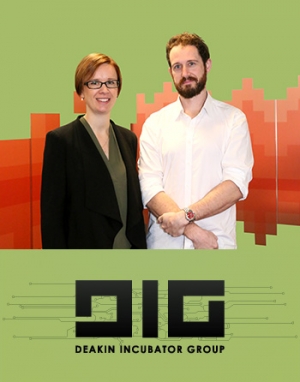Deakin lecturers hatch IT incubator
Research news
Facebook, Google and Microsoft were all established while their founders were still at university.
A small group of academics from Deakin’s School of Information Technology are about to give their students a chance to set up commercial companies and gain a competitive edge when they enter the market place.
Lecturers Dr Greg Bowtell, Dr Shaun Bangay and Mrs Sophie McKenzie, with support from Dr Michael Hobbs, Dr Tim Wilkin and Ms Melanie Randall, have set up the Deakin Incubator Group (DIG) that will be open to students from all disciplines at Deakin, including IT, marketing, business, communications and creative arts – and give them “real world” experience before they leave the campus.
Dr Bowtell was among the first intake of Deakin’s Bachelor of Game Design in 2005. After spending some time in the workforce, he returned to complete his honours and PhD study, focussing on identifying ways that the curriculum could continue to produce job-ready graduates in a competitive market.
“My research showed that IT students and others, particularly those in the creative industries, need experience on commercial projects, to improve their job-readiness, before they graduate,” he said.
“The new hub will provide evidence that students have the commitment and passion to complete extra-curricular work – and show they have the wherewithal to gain the skills they need.”
The hub will be open to any enrolled student at Deakin and projects could span the spectrum of IT-related jobs, from app design, to augmented reality, game design, or wearable computing. Free apps created by the students - showcasing their talents - will be available from the DIG website.
Using Deakin’s Cloud learning environment, which supports on-line learning and distance education for over 10,000 students, the DIG students will work in teams, collaborating, designing and producing innovative solutions for external clients and researchers at Deakin. They will be actively seeking interest from businesses, to discuss potential projects.
Dr Bowtell explained that students will apply to join DIG’s talent pool, as they would with any formal freelance agency. They can then apply for specific jobs as they arise, bringing their technical, design, marketing or programming skills to the task.
“Freelancing is common in IT,” he said. “Each job will have different demands and time commitments, just as in the workforce.”
One of the first projects to be completed was an anti-bullying computer game, called “Safekeeper,” which was developed alongside post-graduate students from Deakin’s Education Faculty and featured input from a small group of high school students. Instead of engaging in combat, like most popular computer games, players of “Safekeeper” work together, developing skills in teamwork and conflict resolution, and learning the benefits of altruism.
Dr Bowtell noted that an important goal of DIG will be to encourage the formation of companies that produce and license content.
“DIG will not only provide a structured ‘simulated studio’ environment, but will also produce commercial applications and seed future game studios. Deakin will, in effect, house a number of functioning development teams within a large studio,” he said.
An equally attractive drawcard is the potential for financial reward. Students involved in a project will receive a financial share if their project is successful. Who knows, the next Facebook or Google could come from Victoria, Australia.
For more information, contact Dr Greg Bowtell at greg.bowtell@deakin.edu.au/ tel: 03 5227 2960 or Dr Shaun Bangay at shaun.bangay@deakin.edu.au
Share this story
 Deakin IT lecturers Mrs Sophie McKenzie and Dr Greg Bowtell.
Deakin IT lecturers Mrs Sophie McKenzie and Dr Greg Bowtell.
